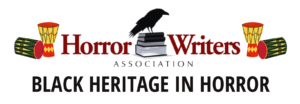Black Heritage in Horror Month 2024: An Interview With Lamar Giles

What inspired you to start writing?
It was simply fun. I was young when I first started making up stories, maybe 7 or 8 years old and when I won a writing contest in 4th grade and was encouraged to keep going. It just felt like something I could do well the same way other kids might be good at shooting a basketball or science. I loved stories and consistently oscillated between reading them and trying to make up ones that were as good as what I was reading.
What was it about the horror genre that drew you to it?
I was indoctrinated by my older cousins when I was very young. Honestly, I was probably too young to see the stuff they were showing me. You’re talking a five-year-old seeing CARRIE, ALIENS, and A NIGHTMARE ON ELM STREET. As terrifying as all that stuff was to my little kid brain, I also began to crave those weekend nights in front of a TV with the latest scary VHS tape on deck. That craving leaked into my reading. Certainly, I started with more age-appropriate “scary” things, like the Bunnicula books. But it wasn’t long before I stumbled across a copy of MISERY by Stephen King on my aunt’s bookshelf. Once I crossed that threshold there was no going back.
Do you make a conscious effort to include African diaspora characters and themes in your writing and if so, what do you want to portray?
I don’t know if it’s so much a conscious effort as an innate requirement for me. I never thought hey I’m going to make myself write a Black perspective. I was always going to write stories about people I know and recognize. That’s Black folks. It never even occurred to me to do something different. Perhaps there was a little bit of defiance mixed in because it seemed to me the sentiment in publishing, across most genres, was “no one” wants to read about people like you, Lamar. I always felt like, well, we’ll see.
What has writing horror taught you about the world and yourself?
It’s nice to face fear that you can take a break from by putting the book down. It’s a level of control you don’t always have facing fear outside of a fictional world. I like that control. It’s something of a pressure valve for the anxiety day-to-day life often inspires in Horror has taught me that I need scary stuff that I can rule either by creating it or being able to place the book back on the shelf until I’m ready to engage again.
How have you seen the horror genre change over the years? And how do you think it will continue to evolve?
I think the biggest change I’ve noticed is more inclusivity. More voices from more cultures are getting a chance to tell stories to a wider audience. I’d like to think inclusivity will continue to expand and attract new talent. It’s what I hope anyway.
How do you feel the Black community has been represented thus far in the genre and what hopes do you have for representation in the genre going forward?
I think there are Black creators who’ve done great work, and we know who they are, but in terms of Black representation so far—if we’re talking over the decades—it hasn’t been great or even always welcomed. Not because the creators aren’t out there, but there are people who see a creator who’s not white/straight/male and immediately, loudly, question their talent, work ethic, credentials, and on and on and on. You don’t have to look far to find toxic reactions anytime a Black person sticks a toe in any genre. I can recall back in the early 2000s when Brandon Massey put together the all-Black DARK DREAMS anthologies. Some people were cool, some made me feel like there was no path for me in horror, as if tokenism was the only reason the collections were published. So I got away from the genre for a while. That’s a broad personal anecdote, but I think it will feel familiar to many Black creators. So what do I hope? I hope that the toxic voices find it less and less comfortable to let their racism/sexism/homophobia show and that leaves an environment that feels more welcoming to up-and-coming creators from all backgrounds.
Who are some of your favorite Black characters in horror?
Tommy Tester from THE BALLAD OF BLACK TOM by Victor LaValle. Dawit and Jessica from the AFRICAN IMMORTAL SERIES by Tananarive Due. Dahlia Childe from BLOOD BROTHERS by Steven Barnes.
Who are some African diaspora horror authors you recommend to our audience check out?
Tananarive Due, though I’d be shocked if anyone in your audience doesn’t know that already. Victor LaValle (again, you probably knew that). Tiffany D. Jackson. Kalynn Bayron. Terry J. Benton-Walker, Erin E. Adams. Those are some great ones to start with.
What is one piece of advice you would give horror authors today?
Read widely. Even if all you want to write is horror, don’t limit your consumption to that because you never know where inspiration may come from.
And to the Black writers out there who are just getting started, what advice would you give them?
Always be working on the next thing. Don’t get hung up on a project not landing where you want, or negative discouraging feedback. Always keep producing. None of it is wasted effort.
 Bio:
Bio:
Lamar Giles is the author of the acclaimed novels The Getaway, The Last Last-Day-of-Summer, Not So Pure, and Simple, SPIN, Fake ID, and has written for globally beloved brands like DC Comics, Star Wars, and National Geographic. He is a founding member of the non-profit We Need Diverse Books and resides in Virginia with his family.



